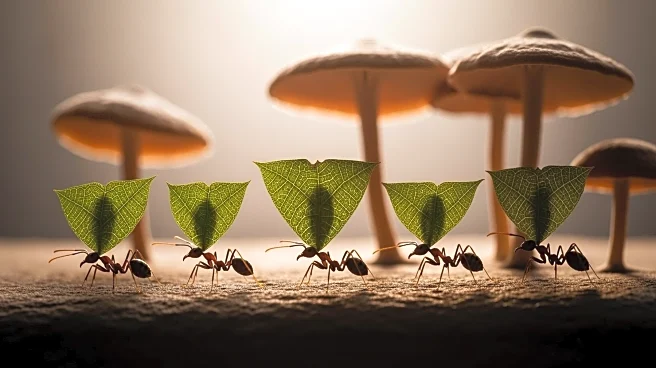What's Happening?
Leafcutter ants have been identified as early pioneers of agriculture, cultivating their own food through fungus farming long before humans began farming. These ants, originating approximately 45-60 million years ago, have developed a symbiotic relationship
with a specialized fungus, Leucoagaricus gongylophorus, which they cultivate using plant matter collected by foraging ants. The ants' farming practices include maintaining the health of the fungus gardens, protecting them from contaminants, and ensuring the survival of the fungus, which cannot reproduce independently. Leafcutter ants are found across South and Central America, Mexico, and parts of southern Texas and western Louisiana, with around 50-60 recognized species primarily in the genera Atta and Acromyrmex.
Why It's Important?
The discovery of leafcutter ants' agricultural practices challenges the notion that humans were the first to cultivate food, highlighting the complexity and sophistication of ant societies. This revelation underscores the importance of studying insect behavior to understand ecological systems and evolutionary biology. The ants' ability to farm and maintain fungus gardens demonstrates advanced social organization and mutualism, offering insights into sustainable agricultural practices. Understanding these systems could inspire innovations in human agriculture, particularly in developing symbiotic relationships for crop cultivation and pest management.
What's Next?
Further research into leafcutter ants' farming techniques could lead to advancements in agricultural technology and pest control strategies. Scientists may explore the potential applications of ant-fungus mutualism in enhancing crop resilience and productivity. Additionally, conservation efforts might focus on preserving the habitats of these ants to maintain ecological balance and biodiversity. As researchers continue to study these ants, new discoveries about their social structures and environmental interactions could emerge, influencing ecological and agricultural sciences.
Beyond the Headlines
The study of leafcutter ants offers a glimpse into the ethical considerations of animal intelligence and the recognition of complex behaviors in non-human species. It raises questions about the anthropocentric view of agriculture and the potential for learning from nature's systems. The ants' farming practices also highlight the importance of biodiversity and the intricate relationships within ecosystems, emphasizing the need for conservation and sustainable practices.














